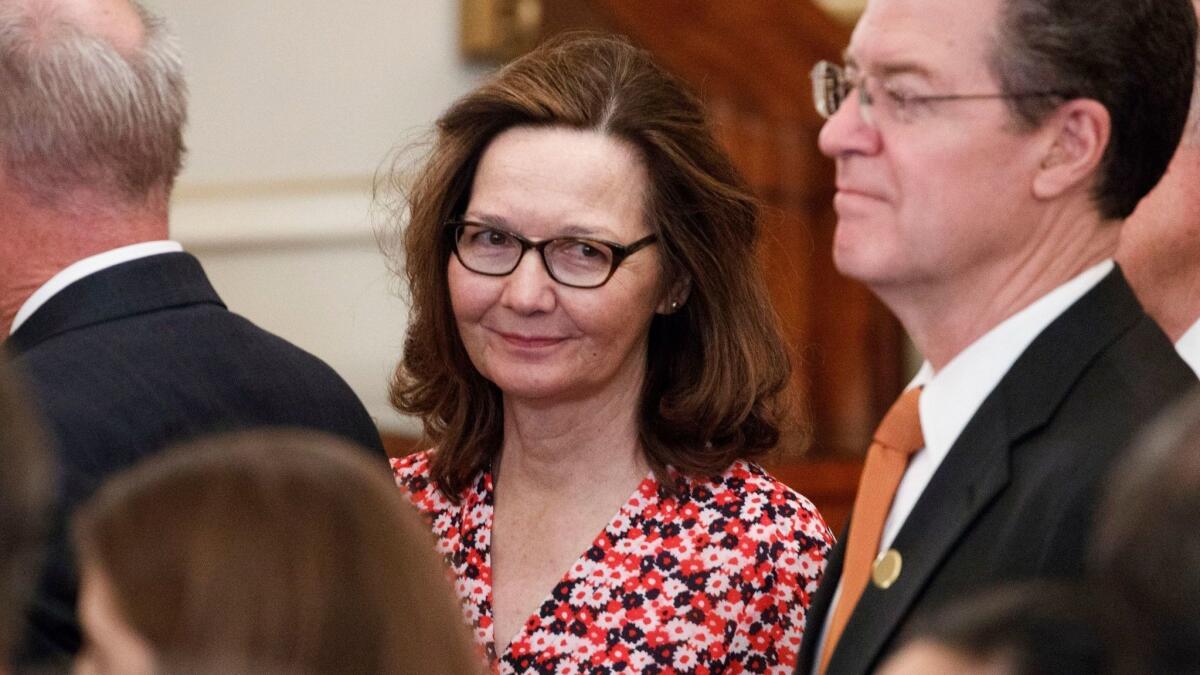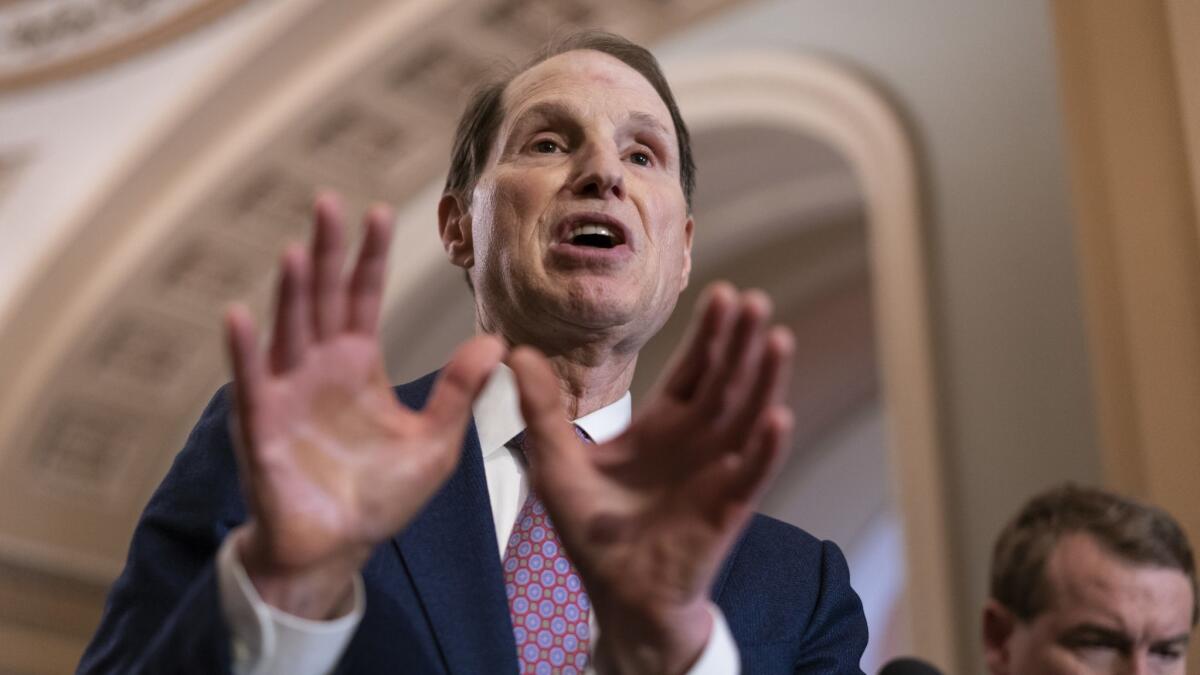Battle over CIA torture program and secrecy looms at Gina Haspel’s confirmation hearing

On Monday, nearly two months after President Trump nominated Gina Haspel to lead the CIA, a stack of binders full of classified material about her three decades as a U.S. spy was delivered to a secure room on Capitol Hill.
The question is whether the last-minute peek behind the curtain will be enough to satisfy skeptics on the Senate Intelligence Committee, which is expected to grill Haspel at her confirmation hearing on Wednesday, or in the full Senate, which then will decide if she becomes the first woman to run the intelligence agency.
Trump reiterated his support Monday after the Washington Post revealed that Haspel had considered withdrawing her nomination to avoid damage to the CIA. In a tweet, Trump called her “highly respected” and said Democrats opposed her “because she is too tough on terror.”
At issue is Haspel’s still-unexplained role after the terrorist attacks of Sept. 11, 2001, when she briefly ran a then-secret CIA prison known as a “black site” in Thailand. Two terrorism suspects were waterboarded and subjected to other forms of abuse at the facility — one before Haspel arrived, one while she was there in 2002 — in an effort to gain useful intelligence.
The CIA later banned those “enhanced interrogation techniques,” which critics called torture. It has refused to say precisely whether Haspel was directly involved in their use, or her views on them.
Sen. Mark R. Warner of Virginia, the top Democrat on the Senate Intelligence Committee, criticized Haspel on Monday for not disclosing more about her 33 years at the CIA.
“The agency has opened itself up to the criticism that it is only releasing favorable materials while suppressing related items that could reflect negatively,” he wrote to Haspel, who is now the CIA’s acting director, in a letter obtained by The Times.
Sen. Ron Wyden (D-Ore.), a member of the committee, also called for greater disclosure.
“This is not how you run a democracy,” he said in a telephone interview. “In a democracy, if there are no sources and methods involved, you have an open debate about nominees. I have read the classified material. I believe a significant amount can be declassified without compromising our country’s security. And senators need to answer to an informed public.”

U.S. intelligence officials have defended keeping Haspel’s record secret, arguing that it’s appropriate for senators to review her classified background behind closed doors before making a decision.
“There’s literally not a single question they could have that could not be answered in a classified or unclassified form,” said one official, who spoke on the condition of anonymity to discuss the process.
Haspel’s confirmation is far from assured, and she may need Democratic votes because Republicans have only a slim majority and support from several remains in doubt. Sen. Rand Paul (R-Ky.) has vowed to oppose her, and Sen. John McCain (R-Ariz.) is being treated for brain cancer in Arizona.
It’s not impossible. Secretary of State Mike Pompeo, whom Haspel would replace at the CIA, faced a similar problem before he was confirmed last month. But Paul dropped his resistance, as did Democrats facing reelection battles this November in states that voted handily for Trump. The final tally was 57 to 42.
As with Pompeo, Senate Minority Leader Charles E. Schumer (D-N.Y.) hasn’t directed members of his caucus to vote one way or another on Haspel. That could allow some Democrats political breathing room to back her. None has publicly supported her so far.
“Unfortunately, in this environment, we expect every vote will be close,” said Marc Short, the White House’s director of legislative affairs.
Follow the latest news of the Trump administration on Essential Washington »
Despite the political gantlet, Haspel has drawn unusual support from current and former colleagues in the intelligence community. In statements, interviews, podcasts and letters, dozens have publicly backed her nomination.
The White House has been distributing long lists of endorsements, including one on Monday from Mark Sparkman, a former CIA officer.
“She is unafraid to speak the truth, regardless of the setting or audience,” Sparkman wrote in an op-ed in the Hill. “She is a consummate professional who always puts mission and the interests of the republic first.”
In his podcast last week, Michael Morell, who served twice as CIA acting director, described Haspel’s career of high-stakes clandestine operations, including one that led to the arrest of two suspects in the bombing of two U.S. embassies in east Africa in August 1998. Morell also said, “She has done some of the agency’s best work against the Russians.”
Many former intelligence leaders who have raised concerns about Russian interference in the 2016 presidential campaign — and Trump’s reluctance to confront the issue — are strong supporters of Haspel.
The White House has touted their backing, even blasting out quotes from James Clapper, the former director of national intelligence under President Obama, whom Trump has criticized as among “the biggest liars and leakers in Washington.”
“She is capable, smart, very experienced, well respected by the Agency rank and file, and a great person,” Clapper wrote on the Cipher Brief, a website focused on intelligence issues.
The CIA recently released a bare-bones resume for Haspel, which includes job titles but few details other than noting that she joined in 1985 and was posted to Africa and Eastern Europe during the waning days of the Cold War.
It said she grew increasingly concerned about terrorism in the 1990s and joined the CIA’s counterterrorism program on the same day jetliners crashed into the World Trade Center, the Pentagon and a field in Pennsylvania.
She remained undercover until February 2017, when she was named deputy director. She became acting director on April 26 after Pompeo started at the State Department.
The CIA also declassified a 2011 memo that said Haspel did not break any rules in 2005 when she helped destroy video recordings of brutal interrogations at the “black site” in Thailand.
Haspel drafted a cable that her boss — Jose Rodriguez, then the director of the National Clandestine Service — sent to order officers to feed the tapes into an industrial shredder.
“I have found no fault with the performance of Ms. Haspel,” Morell, who was then CIA deputy director, wrote in the 2011 memo. “It was not her decision to destroy the tapes; it was Mr. Rodriguez’s.”
Haspel advocated inside the agency for the tapes to be destroyed, however, according to a book by John Rizzo, former CIA acting general counsel. And for critics, the memo’s release was only further proof that the CIA should not be trusted to decide what becomes public.
Chris Anders, deputy director of the ACLU Washington Legislative Office, described the document as “very self-serving.”
“They keep putting out additional bits and pieces of her information, when none of that information is related to what senators want to see,” Anders said.
Twitter: @chrismegerian
More to Read
Get the L.A. Times Politics newsletter
Deeply reported insights into legislation, politics and policy from Sacramento, Washington and beyond. In your inbox three times per week.
You may occasionally receive promotional content from the Los Angeles Times.







